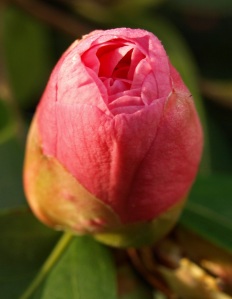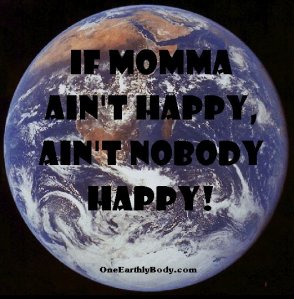Every night the news shows us—in graphic detail—all the myriad ways that our world is ill. So many of us are physically and emotionally ill—we ourselves feel ill in many ways. We get flu shots regularly. Most of us take anti-depressants. Our communities seem like they are under siege, beset by drug lords and gangs and poverty. The national political scene is like a schoolyard brawl, complete with name calling and mud slinging. To top it all off, we are told that the very planet we live on is coming apart at the seems. And, underneath it all, our parents, our teachers, our ministers, our philosophers and everyone else seem in agreement: it’s all our fault. Humans are just born defective. The Bible tells us so. We are born in sin, temptation to sin is woven into the very fabric of this world, we’re just all likely to be going to Hell. The world sure seems to be. So we lock our doors. Close our windows. Try to separate ourselves from our “base natures”, trying so hard to “be good”, so that maybe, just maybe, some of the ills of this world will pass us by. But, somehow, they find their way in under the door anyway. We are profoundly alienated from our own natures and from the natural world around us.
The world’s problems seem overwhelming and impossible to begin to solve. Often we just turn off awareness of them: turn off the news, tune into entertainment media, blast monsters in games rather than even thinking about how to vanquish real monsters in life. But part of what is overwhelming is that “humanity” or the world as a whole is too big to contemplate. We can’t wrap our brains around something that big. One of the ways that we manage big concepts or entities is by comparing them to something smaller that we do understand. For example, we frequently compare large groups of humans that come together for some common purpose to a single “body”. We say, “student body,” “body politic,” “national body,” etc. Even the word “corporation” comes from “corpus,” which is Latin for “body.” This is our most common metaphor for how humans can work together in large groups. We use this metaphor every time we say, “head of the committee” or “corporate head”. Our courts have enshrined it into law by allowing corporations to have the same rights as a “person”. Another way we use metaphor to make something inconceivably large comprehensible by comparing it to something we can understand is when we call our planet “Mother Earth” or “Spaceship Earth”. The Earth is vast. Too vast to get around. But we know what mothers are, and what spaceships are. We can comprehend those. But all of these metaphors are inaccurate. Science has a phrase, “good models make good results” or, in other words, “garbage in/garbage out.” If our model for a thing is inaccurate, it produces worthless results. When we look around at the myriad personal, social and planetary ills our conceptions of our world have produced I think maybe it’s time to look at the models of the world we are using to create that human world together!
A more accurate model is to see the planet, as a whole, as a single body. This now allows us to include the rest of the planet—all the life that is beyond humanity—the plants that make the oxygen we need for our next breath, the animals whose bodies provide the building blocks for our own, the roots that sequester carbon dioxide…the entire, complex, living world upon which our very lives depend. And this new metaphor puts humanity and our individual human lives in a new perspective. As cells in a Greater Body, when we come together we make something more like a nervous system for the planet. The nervous system in a body is important, but it’s not the only organ system that’s important. (Try living without your heart—or your lungs…) Nor is the nervous system made of only one kind of neuron. There are myriad neurons and ways neurons come together to make the spinal chord, various nodes and junctures, sensory neurons in the skin and muscles, neurons that coordinate the movement of muscle or the functioning of other organs like the stomach or liver. And all of these different sizes, shapes and kinds of neurons all work together to coordinate the functioning of the body. They also allow us to know and explore our surroundings, to respond to threat or to enjoy goodness, and they collect, store and remember information vital to our survival. So this new metaphor not only puts us back in our proper place in the life around us: part of a cooperative whole with all life on Earth; but also gives humanity a new conception of our role in that life: to coordinate, explore, and collect information and to use that information collectively to accumulate knowledge and wisdom.
 This new way of conceiving of our planet and our relationship to it yields another new metaphor to guide us: that of health. Now we have a new framework for tackling the myriad personal, social and environmental ills that besiege us: personal and planetary health. Now we know how to participate in the healing of our world—we need to do what cells do. Healthy cells in a healthy body are in their bliss—they joyfully, wholeheartedly, produce or do what they were born to do. No one has to force them into it, or even to cajole or guilt-trip them. They know what they were born to do because it gives them joy. If it doesn’t feel good, it isn’t good. And when all the cells in the body are doing what they love at the top of their voice, then the whole body is awash in all it needs for health. Each cell freely and generously gives what it’s here to give and, in turn, the cell is bathed in the nurturance the healthy body provides. The definition of health, then, when each cell in the body is in glowing health and producing exactly what it is here to produce or do and, in turn, is bathed in the abundant nurturance the glowingly healthy body provides each of its cells. So a healthy planet would be when each of the beings in that planet are in their bliss and are doing exactly what brings them the most joy—are each pursuing their unique passion—so that they, in turn, are surfeit with the bounty an abundantly healthy planetary life system provides. This metaphor also gives us a clue as to what humanity’s passion might be. In a healthy body, the nervous system coordinates the work of the other cells in the body; senses, collects, analyzes and preserves, and remembers information; and, ultimately, helps the organism pursue its goals and get what it wants. Simply, we are here to be in bliss, to pursue our passion, and to help the planet fulfill its destiny and take its place among the stars.
This new way of conceiving of our planet and our relationship to it yields another new metaphor to guide us: that of health. Now we have a new framework for tackling the myriad personal, social and environmental ills that besiege us: personal and planetary health. Now we know how to participate in the healing of our world—we need to do what cells do. Healthy cells in a healthy body are in their bliss—they joyfully, wholeheartedly, produce or do what they were born to do. No one has to force them into it, or even to cajole or guilt-trip them. They know what they were born to do because it gives them joy. If it doesn’t feel good, it isn’t good. And when all the cells in the body are doing what they love at the top of their voice, then the whole body is awash in all it needs for health. Each cell freely and generously gives what it’s here to give and, in turn, the cell is bathed in the nurturance the healthy body provides. The definition of health, then, when each cell in the body is in glowing health and producing exactly what it is here to produce or do and, in turn, is bathed in the abundant nurturance the glowingly healthy body provides each of its cells. So a healthy planet would be when each of the beings in that planet are in their bliss and are doing exactly what brings them the most joy—are each pursuing their unique passion—so that they, in turn, are surfeit with the bounty an abundantly healthy planetary life system provides. This metaphor also gives us a clue as to what humanity’s passion might be. In a healthy body, the nervous system coordinates the work of the other cells in the body; senses, collects, analyzes and preserves, and remembers information; and, ultimately, helps the organism pursue its goals and get what it wants. Simply, we are here to be in bliss, to pursue our passion, and to help the planet fulfill its destiny and take its place among the stars.
The first step in following the guidance of this metaphor is to begin to reintegrate our minds with our bodies. There is nothing more special about mind or consciousness than the rest of the body—we simply think so because its the particular human passion: we are the planet’s nervous system, so we over-value our own. Yes, the brain is vital to our bodies, but so is the heart, so are the lungs, so are all the systems and cells that make up the body. I might be able to do without, say, a pinky with less consequence than a lobe of my brain, but even losing a pinky diminishes the whole. And so, the planet might be able to do without humans, but not without diminishing the whole. If the planet has consciousness, I believe She would miss us if we so muck up this world that it can no longer sustain human life. Learning to re-integrate ourselves with the natural world upon which we depend, begins with re-integration with our own authentic nature. And this nature begins with being an embodied consciousness. Plato resented his body because it distracted him from thinking. But I believe that nature or God gave us a body for a reason. And that reason includes inhabiting that body fully and joyfully. I’m not suggesting we be a slave to our appetites or our passions, but that we honor our body as equally “who we are” as our lauded brains. I’m suggesting we partner with and cherish our bodies, what they can do, the beautiful sensations they bring us, the amazing emotional range they sing through our days, and the compassion they can engender for all living beings. This process might be painful at first as we clear away all the neglected thoughts, feelings and sensations that we didn’t want to face at the time. There are exercises to help with that and to make it less painful. But there is also joy buried within us. We’ve been taught to ignore, avoid and repress that joy. We’ve been taught that the world is a harsh and unforgiving place. I’m here to tell you that it is equally a beautiful, wondrous and joyful place. We get to choose which we pay attention to. Today, I’m choosing joy and beauty. I’m choosing health for myself and my planet. Won’t you join me?
__________________________________________________________________
Stay tuned for an upcoming book on this subject: Blessed by Nature: Our Planetary Body Awakening
Leave a comment